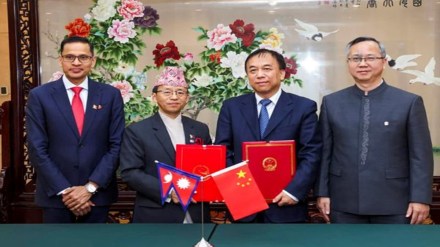Nepal and China on Wednesday (December 4) signed the much-anticipated Belt and Road Initiative (BRI) Cooperation Framework, a significant agreement expected to pave the way for the execution of BRI projects. The agreement was finalised during Nepalese Prime Minister K P Sharma Oli’s official visit to China, his first after assuming office for the fourth time. Prime Minister Oli expressed his honour at the signing, reflecting on his talks with key Chinese officials, including Premier Li Qiang and President Xi Jinping.
Strengthening Nepal-China Economic Cooperation
The framework agreement, signed by Nepal’s Foreign Secretary Amrit Bahadur Rai and Liu Sushe of China’s National Development and Reform Commission, is expected to solidify economic cooperation between the two countries. The BRI aims to create a vast network of infrastructure projects linking China to Southeast Asia, Central Asia, Russia, and Europe. Despite Nepal and China having signed the BRI agreement in 2017, no projects have yet been implemented under the initiative. The new framework agreement is seen as a crucial step towards realising these projects.
The Role of the Trans-Himalayan Connectivity Network
Both countries expressed their readiness to sign an MoU on building the Trans-Himalayan Multi-Dimensional Connectivity Network (THMDCN), focusing on enhancing connectivity in areas such as ports, roads, railways, aviation, power grids, and telecommunications. This initiative is expected to help Nepal transition from a landlocked to a land-linked country. While specific timelines for the projects were not provided, the agreement sets the stage for greater cooperation.
Investment, Aid, and Technical Assistance
One key negotiation point in the agreement was the language surrounding financial support for the BRI projects. Initially, the Nepali side suggested the term “grant,” but the Chinese side proposed replacing it with “investment.” After discussions, both sides agreed on a compromise, including the term “aid and technical assistance” for project execution. This wording reflects a shift from a clear definition of grants, with some projects potentially being funded through lines of credit, which could involve loans.
During his four-day visit to China, Prime Minister Oli emphasized that Nepal would benefit greatly from the BRI, noting China’s strong support for Nepal’s development. Oli also called on Chinese investors to consider Nepal as a promising investment destination. He assured them that the country, which has made strides towards political stability, would provide favourable conditions and security for investments. Oli’s visit and the signing of the BRI framework reflect Nepal’s commitment to deepening its bilateral ties with China and enhancing its infrastructure through international collaboration.
(With agency inputs)
